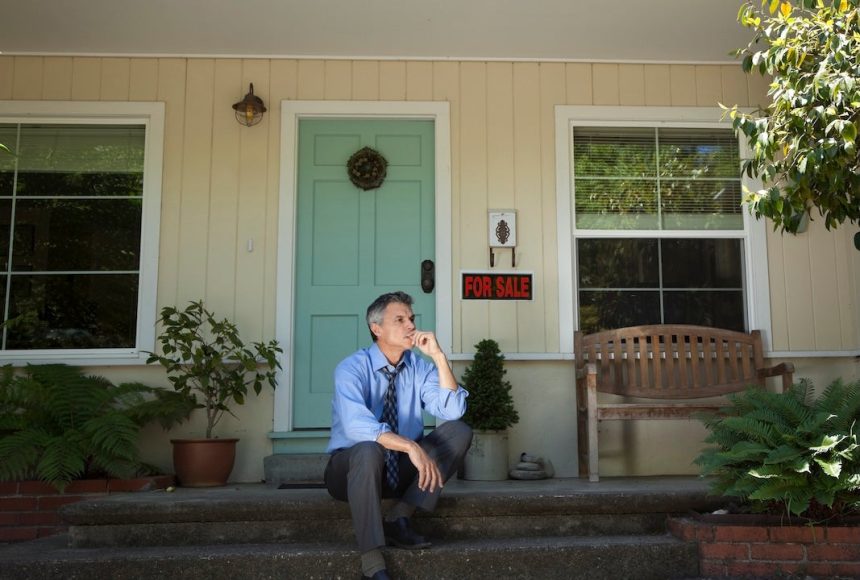Key takeaways
- Defaulting on a home equity loan or HELOC can result in the loss of your home, as it was pledged as collateral for the debt.
- Being in default typically occurs after four consecutive missed payments or 120 days.
- Defaulting also has a negative impact on your credit score and makes it difficult to secure other financing in the future.
Defaulting on any type of loan is never good. However, defaulting on a home equity loan or HELOC, its line-of-credit cousin, has a much more daunting consequence: You could lose your home.
Why? Because when you took out the loan, you pledged the place as collateral for the debt. If you get behind on repayments, aka “delinquent,” the lender has a right to take your property, to recoup its money.
Now, that doesn’t occur overnight – a lot has to happen before an actual foreclosure. Still, a tiny section of borrowers can see those storm clouds gather. The latest data from the Federal Reserve Bank of New York shows that 0.88 percent of HELOC (home equity line of credit) accounts are delinquent by 90 days or more. While that’s not a huge number, it’s a noticeable uptick from the 0.52 percent of HELOCs that were in the same shape one year earlier.
If you’re in danger of joining those ranks, read on to understand what actually happens if you default on a home equity loan or HELOC, how the fallout will impact your finances and mortgage, and what you should do to avoid this doleful situation.
What does defaulting on a home equity loan mean?
To be in default on a loan simply means you have failed to make your scheduled payments on time or according to the agreed terms of the debt. Before you stay awake at night stressing about the potential to default on your home equity loan, it’s important to understand that default doesn’t set in after missing one payment.
“Generally, four months or 120 days of consecutive missed payments will put a loan in default and have the creditor looking to begin collection,” Pahmela Foxley, vice president of mortgage lending at Utah-based Wasatch Peaks Credit Union, says. “This can vary from lender to lender.” Some may give you less time, some a little more.
It’s critical to stay well ahead of that four-month mark. Foxley says that lenders may be willing to make adjustments (for a fee) to avoid sending the loan to collections, a step that involves loads of paperwork and additional work. “Most lenders are willing to work with their borrowers to help them,” she notes, “so it’s crucial to communicate with your lender and have them help you explore options to avoid defaulting on the loan.”
In addition to worrying about the payments, you’ll need to consider the fees that will likely add up in the process. Most lenders charge late payment fees for home equity loans and HELOCs. It’s common to see these charges add up to five percent of the missed payment amount. Though some lenders do set maximums — Regions Bank, for example, caps its late fee at $100 — remember you’ll be charged for each month you miss.
Bankrate’s take:
If you’re falling behind due to a major financial hardship – losing your job, for example – talk to your lender about forbearance, which temporarily stops or lowers your repayments. Some lenders offer forbearance options for as long as 12 months. You’ll still owe the money, usually including the interest, when the forbearance period ends, but you can avoid the major damage that delinquency will do to your credit (more on that below).
What happens if you default on a home equity loan or a HELOC?
While home equity loans and HELOCs differ in their details, the two products work the same way if you don’t live up to your obligation to make payments on time. “Typically, there is no difference between defaulting on a HELOC or home equity loan,” Mark Worthington, branch manager at Churchill Mortgage, says. “Both are mortgages secured against a property, so they fundamentally have the same impact on the asset in the event of a default.”
The worst-case impact is foreclosure – a lengthy process that eventually leads to the lender taking possession of your home, selling it and evicting you. As with a default on your primary mortgage, it won’t happen immediately. Here’s a rundown of the general process:
- One missed payment: If you fail to make a payment during the grace period (often 15 days after the due date), you’ll receive a written notice from your lender.
- Your next payment: Your next statement will include the past due amount, plus a late fee.
- Additonal missed payments: If you still fail to pay and haven’t contacted the lender to discuss your options, you may receive an acceleration notice – part of the clause in your loan agreement that gives a lender the right to demand full repayment – from the lender’s collections department.
- Notice of default: After multiple missed payments – typically somewhere between 90 and 120 days – your lender will issue a notice of default. The local real estate recorder’s office in your town or county will likely receive a copy as well.
- Preforeclosure: The window is closing in this period. Having taken the legal action required in your state, your lender is preparing to move forward with claiming the property. However, even at this point, you have the ability to catch up your payments, request forbearance or even sell the home (which still belongs to you).
- Eviction and foreclosure: If you haven’t managed to come to a resolution, your lender will have the right to proceed with evicting you from the property and selling or auctioning it off.
What happens if the foreclosure property’s sale does not cover the debt?
But your obligations may not stop there. Let’s say you owe the lender $70,000, and the home sells at auction for just $55,000. The lender could technically decide to just wipe that $15,000 off their books and move on. But often, if it’s a serious shortfall, the lender likely going to do whatever it takes to get the amount repaid in full – including taking you to court.
“The lender will file [a request for] a judgment against you for the remaining balance,” Foxley says. If it succeeds,“this could lead to a wage garnishment affecting your weekly paycheck to pay the debt.”
What are the financial repercussions of defaulting on a home equity loan?
In addition to losing your home and possibly a potion of your future wages, defaulting on a home equity loan carries other serious long-term implications for your finances and financial profile. A foreclosure will remain on your credit report for seven years, so any time a company checks your credit – to rent an apartment or to consider a credit card application, for example – they’re going to see a big red flag in your credit history.
Keep in mind that it’s not just the default, either. Making on-time payments weighs heavily on your credit score, and since you have missed multiple months, your credit score will likely be in poor shape. According to a data analysis of more than 84,000 home loans conducted by risk management firm Milliman, one missed payment on a mortgage led to an average 52-point credit score drop, while four missed payments typically translated to a collective drop of more than 98 points.
A lower credit score will create major challenges to your ability to secure other loans, not to mention the best possible interest rates on them.
How does defaulting on a home equity loan affect your mortgage?
Defaulting on your home equity financing has consequences for your other loans too – in particular, the primary mortgage on your home (unless you’ve paid it off). Remember, that’s another lender also waiting to be repaid.
You might assume that if your first mortgage is in good standing, you’re still okay. However, think of it this way: You owe money to two parties. Neither is really more important to pay; they both have to get their regular payments, and if they don’t, both of them have the right to your property. The home equity lender is in a tougher spot, though. If it forces foreclosure, the primary lender is entitled to recoup its outstanding balance first.
“Because [home equity] loans are usually in a second lien position behind the primary mortgage, the process is more complex and challenging for the [home equity] lender,” says Phil Crescenzo Jr., vice president, Southeast Division, Nation One Mortgage.
The home equity lender has two options. It can initiate foreclosure and see how much money is left over after the primary mortgage lender is paid from the sale of the property, or it can try to buy the primary mortgage for a more direct pathway to a sale. Worthington says that lenders usually look at the available equity in the property prior to moving forward.
No matter what route the home equity lender opts to take, the outcome for you, as a borrower, is the same: You’re going to lose your home. And if your primary mortgage is also filed as a default – as Worthington says it typically is – it means that not one, but two, of the worst possible black marks on your credit report will follow you around for the next seven years.
Bottom line on home equity loan defaults
Many homeowners are sitting on a huge pile of home equity right now, which can offer an appealing source of cash. But accessing funds via home equity loans and HELOCs comes with a big responsibility – and risk. Defaulting on them has serious repercussions that can destroy your credit and reduce your odds of getting approved for other financing in the future – not to mention losing the roof over your head.
And while they’re considered second mortgages, don’t let that next-in-line status fool you: Repaying them is just as essential as making your payments on your primary mortgage. Being on time with your mortgage won’t save you from foreclosure if you become seriously delinquent on the home equity debt.
Read the full article here














